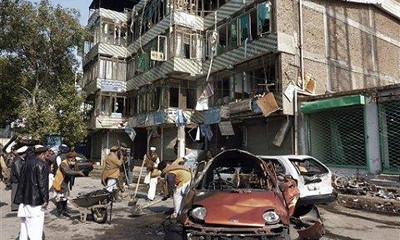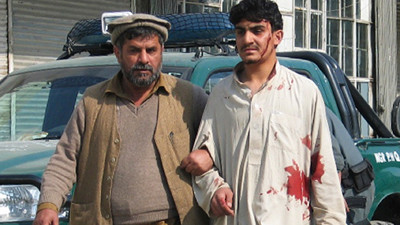By Ernesto Londono and Javed Hamdard
KABUL - More than 200 Afghans were killed in attacks and military operations during the past two weeks, Afghan officials said Saturday, calling it the deadliest period for civilians since the war began.


A blast on February 19, 2011 near a bank in the eastern city of Jalalabad left about 40 people dead and more than 70 injured. Taliban took responsibility for the bloody attack. (Photo: AP)
Two attacks on Saturday added to that toll and fueled fears that violence will climb as winter, typically a slow fighting season in Afghanistan, gives way to spring.
The latest violence comes as U.S. commanders are under heavy pressure to show signs of progress in the nine-year-old war. Insurgent groups, meanwhile, have shown resilience this winter and appear determined to keep the fight raging until foreign troops withdraw.
Afghan civilians are increasingly bearing the brunt of the conflict, once more turning the issue of civilian casualties into a propaganda tool for both sides.
Nine Afghans were killed Saturday morning in Khost province, in the east, when the vehicle they were riding in set off a land mine - a type of weapon typically used to target military personnel.
Hours later, a suicide bomber detonated explosives in Faryab province, in the north, killing three people, including a child, who were watching a traditional Central Asian game called buzkashi.
More than 30 people were wounded in the attack during the game, which involves players on horseback jostling for the headless carcass of a dead goat.
Faryab Gov. Abdul Haq Shafaq blamed the Taliban.
"Who else can blow themselves up?" he said. "They are targeting the innocent people."
Saturday's suicide bombing was the seventh in Afghanistan in the past month. Insurgents have often claimed to target security forces, but the recent bombings suggest leaders of the Taliban and other groups have become less concerned about the fallout civilian casualties generate.
Lutfullah Mashal, a spokesman for Afghanistan's National Directorate of Security, the country's main intelligence agency, told reporters Saturday morning that about 90 percent of the recent civilian casualties have been the result of insurgent attacks.
He said the increase in suicide bombings suggests the Taliban is no longer as willing to engage in conventional fighting with a larger and better-armed contingent of NATO and Afghan forces.
"I think they are desperate because they cannot fight Afghan national security forces in the battlefield," Mashal said. "They are focusing on soft targets."
During a lengthy news conference, directorate officials presented what they described as three would-be suicide bombers who were taken into custody.
One, a 14-year-old boy from Pakistan, was handcuffed and dressed in orange prison garb as he was prompted to tell reporters how the Taliban recruited him.
Taliban members abducted him and two friends as they were walking to school, said the boy, Akhtar Nawaz, from Miranshah, the capital of North Waziristan, a mountainous Taliban stronghold in Pakistan.
Taliban commanders told them they were to carry out suicide attacks in Afghanistan targeting "infidels," he added.
"I don't want to carry out an attack," the boy said he told the commanders. They responded, he added, by saying, "If you don't carry out an attack, we will kill you."
The boy said he was taken to a training camp where he was taught how to fire AK-47 rifles and was given a suicide vest that was designated for an attack on an Afghan army base.
NATO statistics obtained by The Washington Post show the number of civilians killed in insurgent attacks rose slightly last year compared with those tracked in 2009. According to the data, 1,059 civilians were killed in insurgent attacks in 2010, 46 more than in the previous year.
The number of Afghans killed in NATO operations also rose during that period. Last year, 202 civilians were killed by international troops, 21 more than in 2009, according to the figures.
The issue of civilian casualties has long been an irritant in the relationship between NATO commanders and the Afghan government. Leaders from both sides have been at odds over Afghan government allegations that a days-long NATO operation last week in Kunar province killed 65 civilians.
Shahzada Masoud Karzai, a tribal-affairs adviser for the central government, said Saturday that 40 of the casualties were children. He is part of an investigative team that traveled to the northeastern province.
NATO commanders have launched their own investigation.
londonoe@washpost.com Hamdard is a special correspondent. Correspondent Joshua Partlow contributed to this report.



